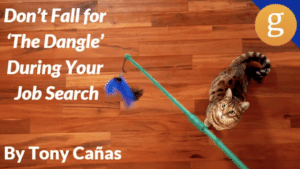Don’t Fall for ‘The Dangle’ During Your Job Search

You’ve been staying in contact with a talent recruiter or hiring manager at a company that you think is a great fit for you. After several weeks or months, they finally call to let you know your dream job is available, and they want you to apply. Fantastic. Congrats!
However, when you open the job description they emailed to you, it’s not exactly the job you discussed with them. Instead, it’s a lower-level job that would require a promotion for the job you want. For example, let’s say you’re a claims adjuster with your heart set on becoming an underwriter. The company you’re pursuing said they had an open underwriter position and thought you’d be GREAT for it – but the job description they sent is for an underwriting assistant (UA) role, not a full-on underwriter.
What gives?
You call the recruiter or hiring manager to ask if they sent the wrong job description. The response you get goes something like this: “Everybody starts as an underwriter assistant, at least for a few months. This allows you to learn the system and how the company works before jumping in as a full underwriter. Don’t worry; it’ll only be for a few months.” You’re disappointed. You were so excited after the original discussion that you told your significant other, family members, and friends about the new job opportunity. You can’t backtrack now!
I’m sorry, my friend, but you have just been a victim of The Dangle!
What is ‘The Dangle’ in talent recruitment?
A dangle is a situation just like that during the job search process, where job seekers think they’re competing for a specific role based on what they were told or that was clearly defined in the job application they submitted, but they’re really being considered for another, lower-level position.
If this happens to you, you must be extremely careful in how you follow up, or you could find yourself in the wrong new job for you with no short-term way out – or up. I’m not saying they lied to you. Maybe it’s true that their underwriters start as UAs or that managers start as supervisors. However, unless a potential employer is willing to put your ideal opportunity in writing, you must analyze their offer based on the role they’re offering right now – not a future role they’re implying you will get. This is regardless of how sure they are that you’ll get that promotion “in just a few months.”
Let’s dig deeper into an example
Mary has two years of claims experience as an associate in claims (AIC) and an AU. She became an AU specifically to move from claims to underwriting, where she thinks she’ll enjoy the job more and have more opportunities for growth. She has been having conversations with a hiring manager at Awesome State Mutual, a small carrier where she thinks she’d be a great fit. The company is also in an area where she’d love to live.
She finally gets a call from the hiring manager, who excitedly tells her, “Mary, I have the perfect role for you to finally become an underwriter for us. Are you interested?” Of course, Mary is interested, and the conversation goes very well. She tells her boyfriend and friends about it. She had laid all the right groundwork and got educated, and now she’s focused on building a good relationship with this hiring manager. She’s confident that if she just does OK in the formal interview, she’ll get a good offer.
After two days, the hiring manager emails her a job description for an underwriting assistant role and includes a couple of dates and times for her interview. Mary is confused. She calls the hiring manager, only to receive a response like the disappointing one above, along with, “You’re still interested in interviewing next week, right?”
Mary is concerned but doesn’t want to lose the opportunity, so she goes through with the interview. During the interview, most of the conversation is about how awesome of an underwriter she will be. A couple of days later, she gets an offer – for the underwriting assistant role, and it pays about 25% less than the underwriting role she really wants. She is also verbally told, “It’ll only be a few months, and we’ll promote you to full underwriter.”
What should Mary do?
She’s excited at the prospect of working for this company and tempted to accept the offer. After all, they said she’ll be an underwriter soon enough. What could possibly go wrong? Now, I’m not saying that accepting the role is the wrong career move, but Mary needs to dig into it further and carefully think through her decision.
First, she should call and ask them to include the upcoming promotion to underwriter, with a defined timeline and salary, in her written offer letter. After all, if it’s so set in stone that it will happen “in just a few months,” why wouldn’t the company put it in writing?
If they’re willing to put it in writing, it’s simple for Mary to think it through: Will the offer for the underwriter job she’ll get in a few months meet her needs? Can she make ends meet for a few months while she’s in what is essentially a trainee role? If the answers are yes to both questions, she should go ahead and accept the role.
If for whatever reason, the company is unwilling to put the timed promotion and salary increase in writing, then Mary must analyze the offer as if no promotion or pay raise is guaranteed since, quite literally, no promotion is guaranteed. She must take the underwriter role out of her mind because that is not the role she is accepting or declining right now. She needs to analyze the offer based on the salary she would get today, not the salary she would get with the promotion.
Once she carefully analyzes and negotiates the details based on the job that is being offered, she can go ahead and decide and follow up on accepting or declining the offer.
The moral of the story
Never make a new job or career decision based on a verbal dangle, whether you’re talking with a recruiter or hiring manager over the phone or during the interview process. It is nothing more than an illusion. A promise that is not formally extended to you on paper is simply a promise that no one is bound to keep.
I’m going to close with a few more examples of dangles that happen during the recruitment process in the insurance industry:
- “You are an accountant, but we’ll start you in the customer service department because we don’t currently have an opening in accounting. But – as soon as we do, we’ll move you over.”
- “You are seeking your first manager-level role, preferably in underwriting, and we’d love to make you a manager, but we need you to put in six months as an underwriter first, so you see what the company is like and learn our systems before we give you a team to manage.”
- “You are seeking a field claims adjuster role, and we’d love to put you on the field, but everybody starts with in-office positions, at least for a few months.”
For much more info on The Dangle and how to handle it, listen to this awesome podcast at Manager Tools.
A good recruiter is a trusted advisor
At Goodwin Recruiting, we know the job search process is critical and personal to you. It is our top priority to be transparent and forthright with our job candidates and clients alike. Upholding integrity in everything we do is how we build strong, long-term relationships and why professionals and hiring companies keep coming back to us for assistance in talent recruitment and placement. We would be honored to work with you and help advance your career! Contact us for access to great jobs with today’s leading employers in multiple industries.
*To read Tony’s original blog piece, view it here on the Insurance Nerds website.
Share This Article






































